Related Research Articles
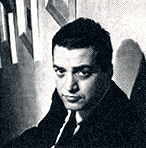
Alfred Bester was an American science fiction author, TV and radio scriptwriter, magazine editor and scriptwriter for comics. He is best remembered for his science fiction, including The Demolished Man, winner of the inaugural Hugo Award in 1953.

Foundation's Friends, Stories in Honor of Isaac Asimov is a 1989 book written in honor of science fiction author Isaac Asimov, in the form of an anthology of short stories set in Asimov's universes, particularly the Foundation universe. The anthology was edited by Martin H. Greenberg, and contributing authors include Ray Bradbury, Robert Silverberg, Frederik Pohl, Poul Anderson, Harry Turtledove, and Orson Scott Card. It commemorated Asimov's 50th anniversairy as an author. A number of writers who contributed to the anthology are also portrayed on the book's cover.
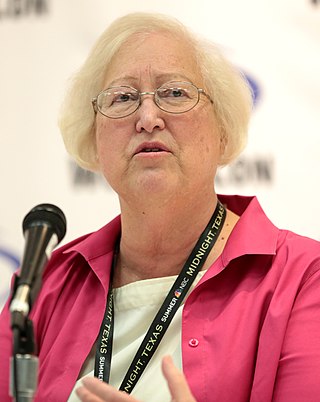
Constance Elaine Trimmer Willis, commonly known as Connie Willis, is an American science fiction and fantasy writer. She has won eleven Hugo Awards and seven Nebula Awards for particular works—more major SF awards than any other writer—most recently the "Best Novel" Hugo and Nebula Awards for Blackout/All Clear (2010). She was inducted by the Science Fiction Hall of Fame in 2009 and the Science Fiction Writers of America named her its 28th SFWA Grand Master in 2011.
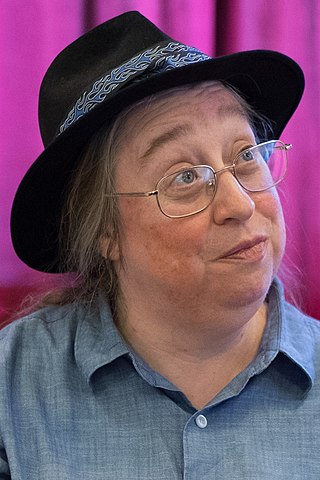
Jo Walton is a Welsh and Canadian fantasy and science fiction writer and poet. She is best known for the fantasy novel Among Others, which won the Hugo and Nebula Awards in 2012, and Tooth and Claw, a Victorian era novel with dragons which won the World Fantasy Award in 2004. Other works by Walton include the Small Change series, in which she blends alternate history with the cozy mystery genre, comprising Farthing, Ha'penny and Half a Crown. Her fantasy novel Lifelode won the 2010 Mythopoeic Award, and her alternate history My Real Children received the 2015 Tiptree Award.
Mike Glyer is both the editor and publisher of the long-running science fiction fan newszine File 770. He has won the Hugo Award 12 times in two categories: File 770 won the Best Fanzine Hugo in 1984, 1985, 1989, 2000, 2001, 2008, 2016 and 2018. Glyer won the Best Fan Writer Hugo in 1984, 1986, 1988, and 2016. The 1982 World Science Fiction Convention (Worldcon) committee presented Glyer a special award in 1982 for "Keeping the Fan in Fanzine Publishing."
"Even the Queen" is a science fiction short story by Connie Willis, exploring the long-term cultural effects of scientific control of menstruation. It was originally published in 1992 in Asimov's Science Fiction, and appears in Willis' short-story collection Impossible Things (1994) and The Best of Connie Willis (2013), as well as in the audio-book Even the Queen and Other Short Stories (1996).

Fire Watch is a book of short stories by Connie Willis, first published in 1984, that touches on time travel, nuclear war, the end of the world, and cornball humour.
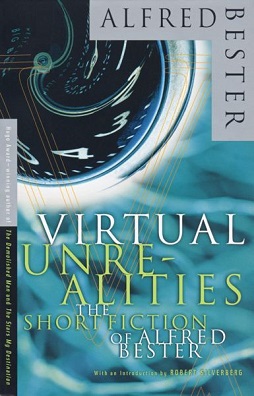
Virtual Unrealities is a collection of science fiction short stories by American writer Alfred Bester with an introduction by Robert Silverberg.

Dr. Phil D’Amato is the central character in three science fiction mystery novelettes and three novels written by Paul Levinson. The first novelette, "The Chronology Protection Case", was adapted into a radio play which was nominated for an Edgar Award by the Mystery Writers of America. The first novel, The Silk Code, won the Locus Award for the Best First Novel of 1999. The fictional D'Amato, who has a PhD in forensic science, is a detective with the NYPD.
The 57th World Science Fiction Convention (Worldcon), also known as Aussiecon Three, was held on 2–6 September 1999 at the Melbourne Convention and Exhibition Centre in Melbourne, Australia.
"Time Is the Traitor" is a science fiction short story by American writer Alfred Bester, originally published in The Magazine of Fantasy and Science Fiction in September, 1953. It is included in the Bester collections The Dark Side of the Earth (1964), Star Light, Star Bright (1976) and Virtual Unrealities (1997) and has been extensively anthologized.
"Fire Watch" is a science fiction novelette by American writer Connie Willis. The story, first published in Isaac Asimov's Science Fiction Magazine in February 1982, involves a time-traveling historian who goes back to the Blitz in London, to participate in the fire lookout at St. Paul's Cathedral.

The Hugo Award is an annual literary award for the best science fiction or fantasy works and achievements of the previous year, given at the World Science Fiction Convention (Worldcon) and chosen by its members. The Hugo is widely considered the premier award in science fiction. The award is administered by the World Science Fiction Society. It is named after Hugo Gernsback, the founder of the pioneering science fiction magazine Amazing Stories. Hugos were first given in 1953, at the 11th World Science Fiction Convention, and have been awarded every year since 1955.
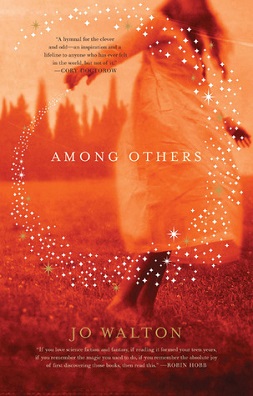
Among Others is a 2011 fantasy novel written by Welsh-Canadian writer Jo Walton, published originally by Tor Books. It is published in the UK by Corsair. It won the 2012 Nebula Award for Best Novel, the Hugo Award for Best Novel and the British Fantasy Award, and was a nominee for the World Fantasy Award for Best Novel.
"The Soul Selects Her Own Society: Invasion and Repulsion: A Chronological Reinterpretation of Two of Emily Dickinson's Poems: A Wellsian Perspective" is a 1996 science fiction short story by Connie Willis. It was first published in Asimov's Science Fiction in April 1996, but written for the anthology War of the Worlds: Global Dispatches, in which it was published in June 1996; it was subsequently republished in War of the Worlds: Fresh Perspectives on the H. G. Wells Classic (2005), in This is My Funniest: Leading Science Fiction Writers Present Their Funniest Stories Ever (2006), in The Winds of Marble Arch and Other Stories (2007), and in The Best of Connie Willis: Award-Winning Stories (2013).

Nebula Awards Showcase 2013 is an anthology of science fiction short works edited by Catherine Asaro. It was first published in trade paperback by Pyr in May 2013.
"The Pi Man" is a science fiction short story by American writer Alfred Bester. It was first published in Fantasy and Science Fiction, in 1959. Bester subsequently revised it extensively for his 1976 collection Star Light, Star Bright, changing the characters' names, "develop(ing) minor scenes", modifying the typographical "word pictures", and deleting several "stale references to beatnik culture".
The Science Fiction Awards Database (SFADB) is an index of science fiction, fantasy, and horror awards compiled by Mark R. Kelly and published by the Locus Science Fiction Foundation. Known formerly as the Locus Index to SF Awards, it has been cited as an invaluable science fiction resource, and is often more up-to-date than the awards' own websites.

An Informal History of the Hugos is a 2018 reference work on science fiction and fantasy written by Jo Walton. In it, she asks if the nominees for the Hugo Award for Best Novel were indeed the best five books of the year, using as reference shortlists from other awards in the genre. After looking at the first 48 years of the award and presenting essays on select nominees, Walton concludes that the Hugo has a 69% success rate. The book was well-received and was itself nominated for a Hugo Award in 2019.
References
- ↑ Bester, Alfred. "The Men Who Murdered Mohammed" at Uchronia.net], retrieved February 7, 2011
- ↑ 1959 Hugo Awards at TheHugoAwards.org (retrieved February 7, 2011)
- ↑ "Virtual Unrealities by Alfred Bester, reviewed by Arthur D. Hlavaty", from the New York Review of Science Fiction, archived at maroney.org, retrieved February 7, 2011
- ↑ Connie Willis talks BLACKOUT (part 6), by Ali Kokmen, SUVUDU.com, posted February 21, 2010, retrieved February 7, 2011
- ↑ Five Short Stories with Useless Time Travel, by Jo Walton, at TOR.com, posted July 05, 2010, retrieved February 7, 2011